Worried about leaving your PC plugged into its UPS around the clock, even when off? This constant connection might raise concerns about energy waste or safety, but the reality is quite straightforward.
Yes, you can and should keep a powered-off PC plugged into a UPS 24/7. The UPS is designed for this and continues to protect your PC from surges even when the PC is off.
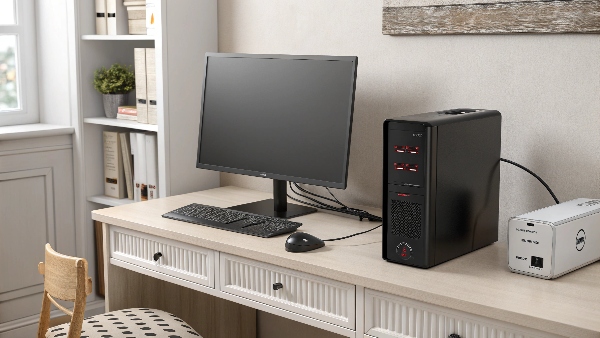
Based on my decade of experience at DAOPULSE, specializing in uninterruptible power supplies, I can confidently say that a UPS is designed to be continuously connected to both the mains power and your equipment (the load), like your PC. You don't need to unplug it. In fact, leaving it plugged in ensures your PC receives constant protection from power surges, spikes, and sags, even when it's powered down. It's a very safe practice and is exactly how UPS systems are intended to be used. For procurement managers or system integrators, this "set it and forget it" aspect of UPS protection is a key benefit for ensuring ongoing equipment safety without active management.
Is it OK to keep UPS plugged in all the time?
Concerned about leaving your UPS unit continuously plugged into the wall outlet? You might wonder if this constant connection poses any risks, wastes energy, or shortens the UPS's lifespan.
Yes, it is perfectly okay and highly recommended to keep your UPS plugged in all the time. This ensures its battery remains charged and it's ready to protect your connected devices instantly.
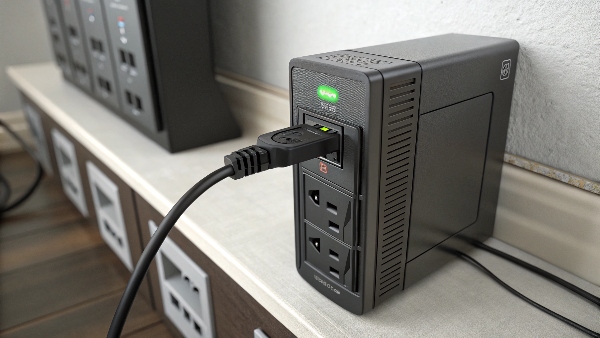
Absolutely, it's more than okay – it's the intended way to use a UPS. Here’s why:
- Battery Charging: The primary reason to keep a UPS plugged in is to ensure its internal battery stays fully charged. If you unplug the UPS, its battery will eventually discharge, and it won't be able to provide backup power when you need it. Modern UPS systems have smart charging circuits that prevent overcharging and maintain the battery at an optimal level.
- Constant Protection: Even when your PC is off, if the UPS is plugged in, its surge protection and line filtering capabilities are still active, protecting your PC from electrical disturbances. Power surges can happen at any time, regardless of whether your devices are on or off.
- Ready for Action: When a power outage occurs, a plugged-in UPS can instantly switch to battery power, providing a seamless transition for your connected equipment. If it were unplugged, it would be useless.
At DAOPULSE, all our UPS systems, from lead-acid battery UPS solutions to our advanced lithium battery UPS solutions, are designed for continuous operation. They are built to be safe and efficient when left plugged in 24/7. For our clients, such as Mr. Li, a Procurement Manager at a Hospital Infrastructure Company, this reliability and constant readiness are critical. They need to know their equipment is always protected without requiring daily intervention. Our comprehensive testing and CE, RoHS, and ISO certifications attest to the safety and design integrity for such continuous use.
How long can my PC run on UPS?
Wondering how much time your UPS will give you during a blackout? This is a critical factor, as too little time means a rushed shutdown, while too much might be an unnecessary expense.
The runtime of a PC on a UPS depends on the UPS's battery capacity (VA/Watts) and the PC's power draw. Typically, it's 5-15 minutes, enough for a safe shutdown, but can be longer with larger UPS units.
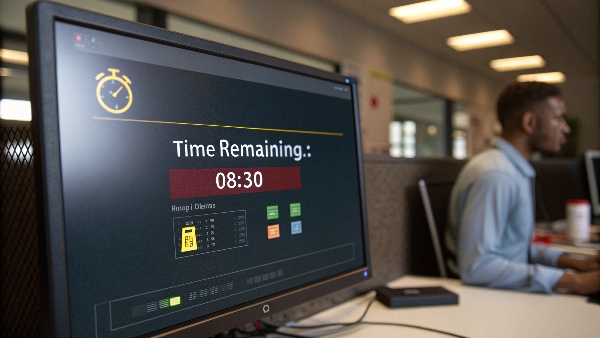
This is a very common and important question, and the answer is, "it depends." Several factors determine how long your PC can run on UPS battery power:
- UPS Capacity (VA/Watt Rating): Larger UPS units (higher Volt-Ampere and Watt ratings) generally have bigger internal batteries or the capability to connect external battery modules (EBMs). More battery capacity equals longer runtime.
- PC Power Consumption: A high-end gaming PC with a powerful graphics card and multiple monitors will consume significantly more power, and thus drain the UPS battery faster, than a basic office PC used for light tasks.
- Connected Peripherals: Anything else plugged into the battery-backed outlets of the UPS (monitor, modem, router, external drives) will also draw power and reduce the runtime available for the PC itself.
- Battery Age and Health: UPS batteries degrade over time. An older battery won't hold as much charge as a new one, leading to shorter runtimes. We recommend regular battery health checks. Our lithium battery UPS solutions generally offer a longer service life compared to traditional lead-acid batteries.
- Efficiency of the UPS: The efficiency of the UPS itself when running on battery also plays a small role.
Typically, a standard consumer-grade UPS is designed to provide enough runtime – around 5 to 15 minutes for an average PC setup – to allow you to save your work and perform an orderly shutdown. It's not usually intended for prolonged work during an outage unless it's a system specifically designed for extended runtime with EBMs. At DAOPULSE, our patented technology development includes innovations to improve UPS efficiency and battery management, maximizing the effective runtime for our clients. When we design and customize UPS systems, we carefully consider the client's specific load and required runtime to ensure the solution meets their operational needs.
| UPS Size (Typical) | Load Example | Estimated Runtime |
|---|---|---|
| 600VA / 360W | Basic Office PC & Monitor | 7-12 minutes |
| 1000VA / 600W | Mid-Range PC & Monitor | 8-15 minutes |
| 1500VA / 900W | Gaming PC & Monitor | 5-10 minutes |
| 2200VA / 1320W | Workstation, multiple items | 6-12 minutes (more with EBMs) |
Should I unplug my PC from UPS?
Considering whether to disconnect your PC from its UPS when not in use? You might think this saves power or protects the PC, but it might actually do the opposite.
No, you generally should not unplug your PC from the UPS. Keeping it plugged in allows the UPS to provide continuous surge protection and ensures the PC is ready for a safe startup/shutdown sequence.
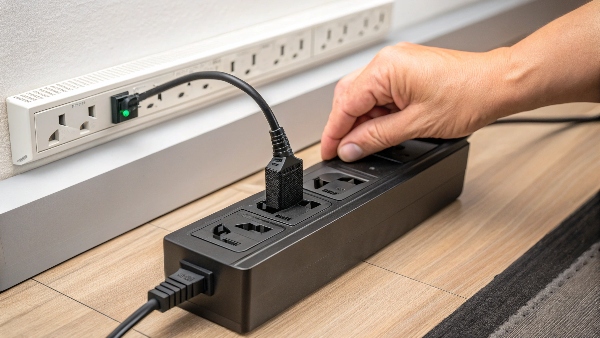
Generally, no, there's no need to unplug your PC from the UPS, and it's usually better to leave it connected. Here’s why:
- Continuous Surge Protection: As mentioned earlier, the UPS provides surge protection even when your PC is off. Electrical surges can damage components even in a powered-down state. If you unplug the PC from the UPS, it loses this protection.
- Battery Maintenance: The UPS itself needs to remain plugged into the wall to keep its battery charged. If you also unplugged the UPS entirely, its battery would discharge.
- Convenience and Proper Shutdown: Most UPS units come with software that can communicate with your PC. If a power outage occurs while you're away, this software can trigger an automatic, graceful shutdown of your PC once the battery reaches a certain low level. This feature only works if the PC is connected to the UPS and the UPS to the mains.
- Minimal "Phantom" Draw: A powered-off PC, even when plugged in, consumes very little power (often called phantom or vampire draw). The energy saved by unplugging it from the UPS (which itself consumes a small amount of power to stay active) is usually negligible for most users.
The only scenarios where you might consider unplugging your PC (and potentially the UPS) are:
- Extended Absences: If you're going away for a very long period (weeks or months), some people choose to unplug all electronics.
- Severe Electrical Storms: During intense thunderstorms with frequent lightning, some people take the extra precaution of unplugging sensitive electronics, even those on a surge protector or UPS, as a very close or direct lightning strike can overwhelm any protection.
For everyday use, leaving your PC plugged into the UPS, and the UPS plugged into the wall, is the standard and recommended practice. This ensures maximum protection and readiness. Our team at DAOPULSE designs UPS systems for this exact continuous, protective role, delivering peace of mind to clients globally.
Is it OK to leave your PC plugged in all the time?
Debating whether it's safe or economical to leave your desktop PC plugged in 24/7? Concerns about energy use, wear and tear, or even fire hazards might cross your mind.
Yes, it is generally okay to leave your PC plugged in all the time, especially if it's connected through a quality UPS. Modern PCs are designed for this, and the power draw when off or in sleep mode is minimal.
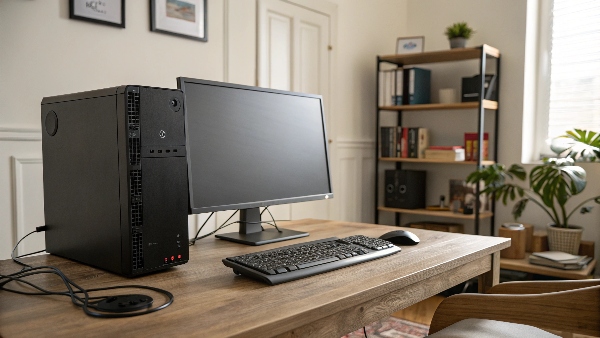
Yes, for the vast majority of modern desktop PCs, it is perfectly okay to leave them plugged in all the time. Here's why this is a common and generally safe practice:
- Designed for It: PCs and their power supply units (PSUs) are designed to be connected to mains power continuously. When the PC is turned off (properly shut down, not just sleep mode), it draws a very small amount of "phantom" or "standby" power. This power is used for features like Wake-on-LAN, keeping the power button responsive, and maintaining system time.
- No Significant Wear and Tear: Leaving a PC plugged in while off doesn't cause significant wear and tear on the components. The electrical components are not under heavy load.
- Convenience: It allows for quick startups and enables features like scheduled tasks or remote access if configured.
- Safety with a UPS: If your PC is plugged into a UPS (which is then plugged into the wall), it's even safer. The UPS provides protection against power surges and sags that could potentially harm a PC, even when it's off. This is a key service we provide at DAOPULSE with our comprehensively tested and certified UPS systems1.
- Energy Consumption: While there is some standby power consumption, it's typically very low for modern PCs (often just a few watts). The cost associated with this is usually minimal. If energy saving is a major concern, ensuring the PC is fully shut down rather than in sleep mode will reduce this further. Some users opt for smart power strips that can cut power to peripherals when the PC is off.
The main reasons to unplug a PC would be:
- Severe electrical storms: As an extra precaution against lightning.
- Internal maintenance: When you're opening the case to work on components.
- Very long absences: If you'll be away for an extended period.
For everyday scenarios, leaving your PC plugged in, ideally through a reliable UPS like those we manufacture, is standard practice and helps protect your investment. Our global clients, including those in critical infrastructure like data centers and hospitals, rely on this continuous protective capability.
Conclusion
Keeping your PC plugged into a UPS 24/7 is safe and recommended. This ensures constant protection and a charged battery, safeguarding your system effectively without needing to unplug it.
-
Exploring UPS systems can enhance your PC's safety and longevity, protecting it from power issues. ↩

